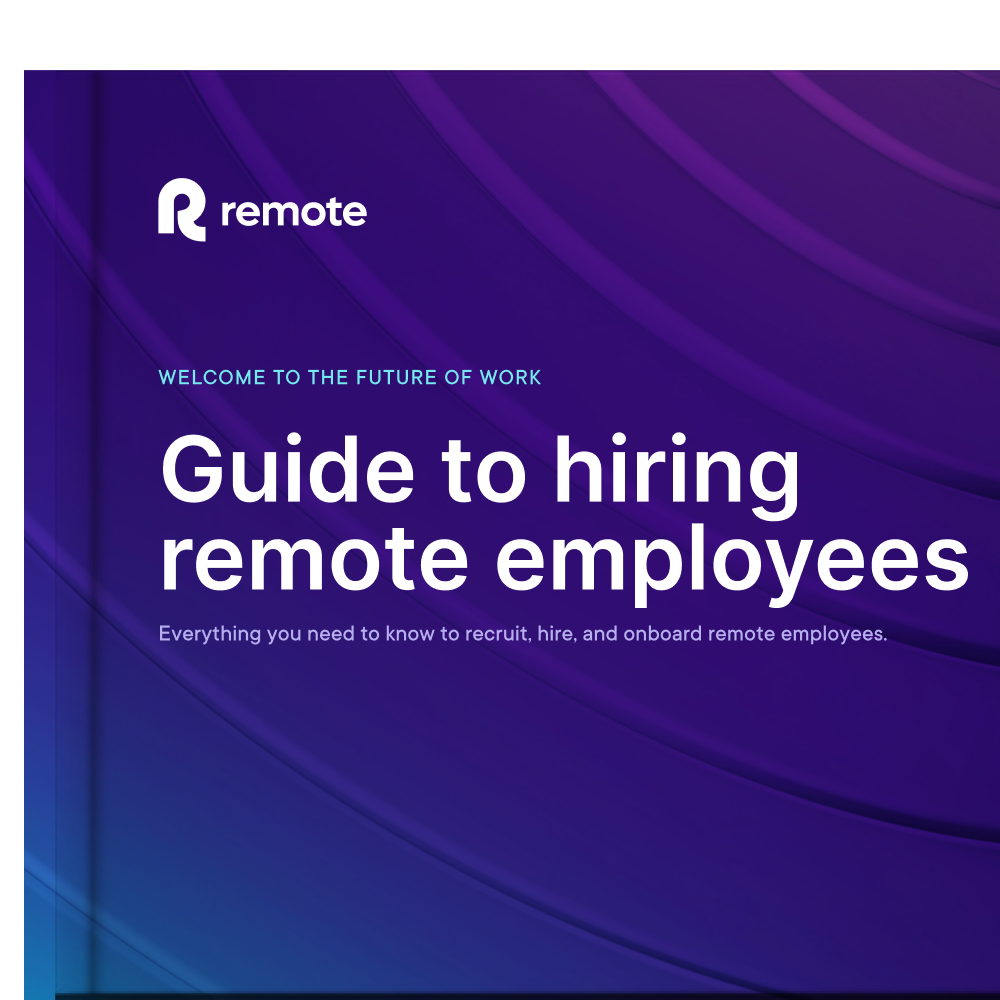
Remote & Async Work — 6 min

Remote & Async Work — 19 min
First came the industrial revolution, then the digital transformation, and now — we’re in the midst of a remote work boom.
With employees demanding more flexibility, companies around the world have had to reconsider their business models to attract and retain top talent. As a result, many sectors, job roles, and countries are rapidly embracing a future of remote work — but which are leading the way?
This article reveals which job roles and industries currently offer the most remote career opportunities. We’ll also examine the salaries offered for these remote roles to highlight the most lucrative opportunities and see how wages compare to industry averages.
With the rise of digital technology and the post-pandemic shift toward remote work, more and more companies are embracing the benefits of hiring remote employees.
Here are the top 10 job industries, according to The National Bureau of Economic Research, that are expected to hire remote workers in 2023.
Rank | Job Role | Approximate % of openings that allow remote work |
1 | Computer and mathematical | 35% |
2 | Business and finance operations | 27% |
3 | Legal | 24% |
4 | Management | 17% |
5 | Architecture and engineering | 15% |
6 | Life, physical, and social sciences | 15% |
7 | Art, design, and entertainment | 14% |
8 | Community and social service | 13% |
9 | Office and administrative support | 10% |
10 | Sales and related | 9% |
Remote tech jobs are the most popular. Recent research has found that companies within the computer and mathematical work industries are leading the way in remote work opportunities. In 2023, the data indicated that 35% of jobs listed on job-posting websites like LinkedIn were advertising for remote employees.
This means that job seekers looking for work in areas such as technology or data science have a greater chance of securing work-from-home positions that suit their needs and preferences.
Here are reasons why computer and mathematical work are leading the charts:
Heavy reliance on digital tools so tasks can be performed from anywhere
Companies are using remote work to reduce overhead costs associated with traditional office spaces
Offering remote work opportunities can help attract and keep top talent — remote tech jobs are highly sought-after
At Remote, we believe that remote work is the future of work. That’s why we are dedicated to empowering companies of all sizes to embrace this trend and benefit from the many advantages it can bring to your business.
Remote's global HR experts share practical advice for building a locally relevant and globally compliant benefits program to help you attract and retain the world's best talent.
Remote's global HR experts share practical advice for building a locally relevant and globally compliant benefits program to help you attract and keep the world's best talent.

Certain work industries and jobs are embracing remote work more readily than others.
Here are the top job positions that are expected to have a high number of remote openings, according to recent research by the US Bureau of Labor Statistics.
Rank | Job position | Predicted number of remote job openings (2023-2031) |
1 | Software developers | 143,400 |
2 | Accountants and auditors | 136,400 |
3 | Market research analysts and marketing specialists | 99,800 |
4 | Computer and support specialists | 58,900 |
5 | Lawyers | 48,700 |
6 | Computer and information systems managers | 48,500 |
7 | Marketing managers | 32,200 |
8 | Sales representatives | 30,400 |
9 | Public relations specialists | 27,400 |
10 | Finance and investment analysts | 26,900 |
When analyzing industries, our research reveals that information technology emerges as the most in-demand industry for remote workers. In 2021, 62.8% of all software developer jobs were remote — by 2031, this number is set to skyrocket.
There are many reasons why software development is the world’s most remote-friendly job, such as:
It includes highly independent work that can be completed and delivered electronically
It’s a digital industry by nature that relies on technology and computers rather than face-to-face interactions
There’s a high demand for talent, meaning that companies are willing to provide more worker perks to get a competitive edge and gain top talent
Due to its online nature, this sector has more opportunities for solely online work than other industries like hospitality or communications.
Companies are increasingly seeking remote workers who are self-motivated, adaptable, and able to work independently. However, to give yourself a competitive edge in the remote work market, it’s important to know which specific skills and tools are in demand within your industry.
Here’s what the top five remote work industries are looking for in remote workers:
Computer and mathematical: Companies are looking for remote software developers who have expertise in coding languages such as Java, Python, and C++. They should also be familiar with software development tools such as Git, Jira, and Docker.
Business and finance operations: Remote workers in business and finance operations should have strong analytical skills, be familiar with finance software such as Quickbooks or Xero, and have experience with online data analysis and reporting.
Legal: Remote workers in the legal industry should have strong research and writing skills, be familiar with legal software such as LexisNexis or Westlaw, and have experience with legal research and document review.
Management: Managers should have strong leadership skills, be familiar with project management software such as Asana or Trello, and have experience with team management and collaboration. They should also be able to work independently and have excellent communication skills.
Architecture and engineering: Remote workers in architecture and engineering should have strong technical skills, and have experience using online design materials such as AutoCAD or SketchUp.
Skills that all companies are looking for in remote workers:
Communication skills: Effective communication is critical in remote work environments, where team members may be working from different locations and time zones. Companies are looking for remote workers who can communicate clearly, collaborate effectively, and build strong relationships with colleagues.
Time management: Remote workers must be able to manage their time effectively, meet deadlines, and prioritize tasks. Companies are looking for remote workers who are self-motivated, organized, and able to work independently.
Technical skills: Many remote work positions require specific technical skills, such as proficiency in software programs, digital marketing tools, and data programs like Excel.
There’s no doubt that remote work is taking over the working world.
In fact, a recent study found that 84% of employees indicated that working from home would make them happier. They said they would be willing to sacrifice salary for jobs that allow working from home more often.
Not only are remote jobs a good option for work-life balance and flexibility, but also for financial benefits. Studies show that remote jobs can be profitable for employees and employers alike, with reduced overhead costs and increased productivity being just a few benefits.
These are the top ten highest-paying remote job roles in 2023, according to Indeed:
Rank | Job position | National average salary (per year) |
1 | Psychiatrist | $268,419 |
2 | General counsel | $159,998 |
3 | iOS developer | $135,673 |
4 | Mobile developer | $134,461 |
5 | Software architect | $133,806 |
6 | Data scientist | $124,683 |
7 | Development operations engineer | $121,945 |
8 | Product designer | $115,986 |
9 | Speech-language pathologist | $115,379 |
10 | User-experience expert | $109,120 |
The table below ranks the top 10 job roles with the largest percentage difference in salary between remote roles and the industry average in the US:
Rank | Job Role | Industry average salary | Average salary remote jobs | Difference in salaries |
1 | Sales | $56,655 | $127,458 | +$70,803 (+125%) |
2 | Personal Assistant | $35,946 | $73,333 | +$37,387 (+104%) |
3 | Public Relations | $44,690 | $86,000 | +$41,310 (+92%) |
4 | Business Development | $67,341 | $128,556 | +$61,215 (+91%) |
5 | Account Manager | $54,864 | $103,960 | +$49,096 (+89%) |
6 | Consultant | $68,159 | $126,667 | +$58,508 (+86%) |
7 | Human Resources | $47,732 | $84,471 | +$36,739 (+77%) |
8 | Financial Advisor | $70,401 | $117,844 | +$47,443 (+67%) |
9 | Cyber Security | $67,568 | $104,875 | +$37,307 (+55%) |
10 | Architect | $83,493 | $128,667 | +$45,174 (+54%) |
In the US, a remote job in the sales sector could see you earning over $70,803 more compared to the industry average salary. The sales sector incorporates a large variety of jobs, from a retail sales associate to someone working in tech sales. Remote working allows those working in sales to expand their reach, potentially into new territories, which is reflected in their pay.
Those working as personal assistants and in the public relations sector also see a significant salary difference in remote job salaries versus their industry average, with both seeing over $35,000 difference in salary offerings for fully remote roles. This could be partly due to many companies reducing, or even getting rid of, their office spaces, meaning they have fewer overheads and can subsequently pay their workers a higher wage.
Barbara Matthews, Chief People Officer at Remote, commented on what this means for employers and job seekers:
“Working remotely can provide many benefits to both companies and workers. As our research shows, one of the key benefits is the associated financial incentives. Amongst many industries, remote roles pay a significantly higher wage than the industry average.
The reasons for this vary from role to role; however, attracting and retaining top tier talent and the significant saving of overhead costs will have a direct impact on the compensation offered by companies across the board. The savings made on rent and office space has also led to companies offering higher pay packets to help cover the employee cost of working remotely.
As employees continue to demand remote or hybrid working and more companies are able to offer this, employers who want to attract top talent will have to consider wage rises or changes in their organization's structure in order to keep pace with their competitors.”
Anonymously introduce your company to Remote and we'll show them how easy it is to manage contractor conversions.

In today’s changing climate, many companies are shifting toward primarily hiring remote workers. This allows for greater flexibility, cost savings, and access to a wider pool of talent from around the world.
Here are three examples of companies that are consistently choosing to hire remote employees.
The US tech giant Microsoft is a prime example of a company embracing the flexibility of hybrid and remote work.
What this means is that employees have the option to work remotely full-time if a job posting indicates this is possible, but are guaranteed the option to work up to 50% in the office and 50% from home. This flexibility has allowed Microsoft to hire talent from all over the world, and it has also helped improve employee satisfaction and productivity.
Some policies Microsoft has implemented to make hybrid work possible include:
Allowing employees to choose work hours that suit their schedule
Using Microsoft Teams to help support asynchronous work
Creating a culture that supports hybrid work with managers who are trained to lead hybrid teams and employees
As a company, Microsoft is well-known for its technology products, and of course it has plenty of remote tech jobs. But advertising and HR job opportunities can also be performed 100% remotely. The job site has a convenient filter for finding work-from-home positions in these fields.
When hiring for remote roles, Microsoft looks for candidates who:
Have an up-to-date and comprehensive understanding of the tech industry and current affairs
Communicate well with different team members
Have a growth mindset
Mayo Clinic is a leading healthcare organization that’s also embracing the benefits of remote work. The clinic recognizes that remote work can provide employees with greater flexibility, work-life balance, and the ability to work from anywhere in the world.
This has allowed Mayo Clinic to attract top talent from across the globe while still maintaining a collaborative and vibrant work culture based on its core values and mission.
Some policies Mayo Clinic has implemented to make hybrid work possible include:
Providing employees with the necessary technology and resources to work remotely, such as laptops
Encouraging the use of communication and collaboration tools such as email, chat, and video conferencing
Hybrid and remote work training that highlights how to work effectively away from the office
As a medical center, Mayo Clinic has some job positions that require applicants to work in person. However, the company is open to employees working remotely for jobs that don’t require in-person participation, such as:
Director of marketing
Research protocol specialist
Analyst programmer
When hiring for remote roles, Mayo Clinic looks for candidates who:
Have a diverse background
Show compassion and are patient-centered
Are dedicated and passionate about their mission
HubSpot is a leading marketing software company that’s also fully embraced the remote work trend. The company has a ‘work from anywhere that you work best’ philosophy toward remote work that supports its employees' choice to work from home rather than forcing them to return to the office.
Some policies HubSpot has implemented to make hybrid work possible include:
A dedicated resource called RemoteSpot that offers tailored information on working remotely
Defined channels that promote community, such as a Slack room called ‘#remote-brains-trust’ where remote workers can share their experiences working remotely
Customized benefits and work ‘perks’ that reflect a remote-first working lifestyle
As a marketing software company, HubSpot is well-renowned for its marketing expertise. There are various remote work positions available, such as:
Brand copywriter
Customer support specialist
Data analyst
When hiring for remote roles, HubSpot looks for candidates who:
Are self-motivated and able to work independently
Have a strong background in marketing and digital media
Have excellent written and verbal communication skills
Remote work is becoming increasingly popular for both businesses and employees in a number of work industries across the globe.
Companies that embrace remote work can benefit from increased productivity, employee satisfaction, and access to a wider pool of top talent.
It’s important to remember that remote work isn’t a one-size-fits-all solution, and companies must take steps to ensure that their remote employees have the necessary resources, technology, and support to be successful.
However, with careful planning and consideration, remote work can be a win-win situation for both businesses and employees alike.
Get started with Remote today.
Learn the processes you need to find, recruit, and onboard remote employees (and stay compliant while you're at it).

To reveal the top industries and job roles for remote and hybrid opportunities, we investigated 25 leading industries and 40 popular job roles across the United States and United Kingdom. We analyzed Glassdoor job listing data for each industry, role, and country to discover the percentage of job roles advertised as remote and the average salary of each. The remote salaries were then compared to the industry average to reveal the difference in salaries offered for remote jobs.
Note: As remote laborers only make up 0.2% of labor jobs advertised, we made the decision to remove ‘laborers’ from our remote role salary analysis top 10 to give a more accurate representation of the results.
To reveal the countries with the highest percentage of remote workers, we used Eurostat and Statista data to investigate the year-on-year share of employed people who stated they either sometimes or usually work from home (in % of total employed people aged 20-64). By analyzing the trend, we were able to predict the growth of remote workers in each country until 2025.
statista.com/statistics/303589/
statista.com/statistics/1261486/
Data was collected in August 2022.
Subscribe to receive the latest
Remote blog posts and updates in your inbox.

Remote & Async Work — 6 min

Newsroom — 3 min

Product Updates — 6 min

Employer of Record & PEO — 3 min